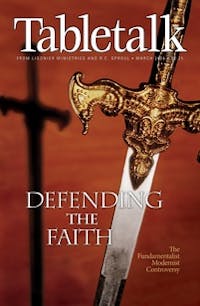
Request your free, three-month trial to Tabletalk magazine. You’ll receive the print issue monthly and gain immediate digital access to decades of archives. This trial is risk-free. No credit card required.
Try Tabletalk NowAlready receive Tabletalk magazine every month?
Verify your email address to gain unlimited access.
As I write, I find myself visiting Gwinnett County, Georgia. It’s a good thing that I am only visiting. If I actually lived here, I’d find myself on the wrong side of the law. It seems the county recently passed a law that says you may not have more than eight people living in a single house at a time. Me, my wife, and my seven children puts us over the limit. The law, I’m pretty sure, wasn’t designed to keep families like mine out of the county. That wasn’t the express intent of the county commissioners. Instead, I believe the intent, though this too wasn’t expressed, was to discourage certain immigrant groups from settling here. Rather than pass a law against those immigrant groups, which wouldn’t be politically correct, they came up with their clumsy solution that also affects large families. This particular law has run smack into another law, the law of unintended consequences. Such always happens when we try an end-around around honesty. When we try to have our way, while hiding our convictions, we lose everything we seek.
It is no new insight to note that in America the evangelical church is worldly and anemic. We are so earthly minded that we are no heavenly good. The anemia comes from the worldliness. But whence comes the worldliness? Like any other sin, we have options for placing its advent. We could argue that it began with the latest fad to hit the church. Or we could go back to the beginning, to the garden. Both have their advantages. It might be more helpful, however, to see the beginning of this descent at the height of the fundamentalist-modernist controversy.
Fundamentalism is so named for a fundamental reason. It was a movement that concerned itself with affirming, defending, and maintaining the fundamentals of the faith. As a movement, it affirmed the authority of the Bible. It affirmed the accounts therein of creation, of miracles, of the virgin birth, of the death and resurrection of Jesus. It affirmed the necessity of conversion through faith in the finished work of Christ. It affirmed, in short, the defining issues of historical evangelicalism. Why, then, isn’t the controversy called “the evangelical-modernist” controversy? To get at that answer we must ask another. What is it that distinguishes evangelicals and fundamentalists? Suddenly our problem becomes clear. An evangelical is a fundamentalist that wants the respect of modernists, and sells his soul to get it.
That is to say, the difference between a fundamentalist and an evangelical isn’t the content of their respective beliefs, but the way in which those beliefs are held. Fundamentalists, to their credit, clung to the fundamentals like a pit bull on a t-bone. There was nothing attractive or sophisticated about it, but everyone knew you’d never tear the two apart. The evangelical, on the other hand, sought to find, at least culturally, a middle ground. Yes, we believe in the authority of the Bible, but we believe it for nice, professional, academic reasons. Indeed, all that we believe we believe for nice, professional, academic reasons. What separates evangelicals from fundamentalists is that we evangelicals don’t breathe fire, and we have fancy degrees hanging in our studies, instead of pictures of Billy Sunday. We evangelicals are they who cut this deal with the modernists, “We will call you brother, if you will call us scholar.”
Please don’t misunderstand. The point isn’t that the right way to believe in the fundamentals is to be stupid. Instead, the point is that the right way to believe in the fundamentals is with a holy indifference to what others think about us. Anything less leads us right where we are. That is, any movement that begins with a fear of those we are seeking to win has already been won by those that are feared. We thought we were defending the fundamentals, but we were giving away the store. Like the Gwinnett county officials, our failure to demonstrate the courage of our convictions led to exactly what we didn’t want. Weakness disguised as compromise compromised our convictions, and exposed our weakness. Because we were too worldly to not care, we have become too worldly to matter.
We still follow that same path today. For fear of offending the lost, we will not tell them they are lost. For fear of looking narrow and close-minded, we have made peace not just with the deadly secularism of modernism, but with the doubly deadly folly of postmodernism. There the culture itself reflects our uncertainty, refusing to make affirmations, just like us. In our pride we have embraced a humility that won’t stand for anything.
Our Shepherd, however, calls us to a different path. He tells us that having those outside the faith revile us for our faith is something to be sought, not something to be avoided, that those who experience the disdain of the world for His name’s sake are blessed. The fundamentalists of the last century were laughed at and scorned. And for that they earned the praise of Jesus. May we find the courage not only to affirm the fundamentals, but may we be given a double portion of the spirit of the fundamentalists. They fought the good fight, while we collaborated. They kept the faith, while we merely kept our positions in our communities. May we learn to fear no man, and to fear God. For such is the beginning of wisdom.
